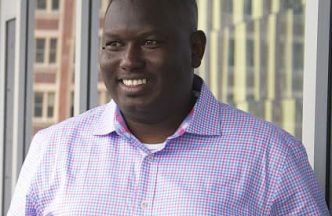
Abdoulaye Banire Diallo
Professor, Director of the Bioinformatics Lab at Université du Québec à Montréal & co-founder and Chief Scientist of at My Intelligent Machines
Keynote
Prof. Abdoulaye Banire Diallo is a Professor (full professor at the age of 26) and Director of the Bioinformatics Lab at Université du Québec à Montréal (UQAM). He is also a co-founder and Chief Scientist of at My Intelligent Machines (MIMs). MIMs is among the top 10 startups to watch in Montreal according to Betakit. In Africa, he co-leads Acces Omic Senegal with the Institute of Recherche en Santé, Surveillance Épidémiologique et de Formation (IRESSEF) of Senegal. This initiative is building the foundation of precision in health in Senegal.
Currently, Abdoulaye’s research is at the intersection between bioinformatics, artificial intelligence and genomics. He is developing technologies that empower life scientists in the health and agrigenomics sectors to address important questions by providing algorithms and machine learning methods to detect, study and monitor pathogens in epidemiological surveillance, to include genomic precision in livestock production models, and to model and monitor biodiversity in agriculture and forestry. He also provides Artificial Intelligent -powered technologies to help deliver to life science communities an easy-to-use and integrated genomic informed solutions.
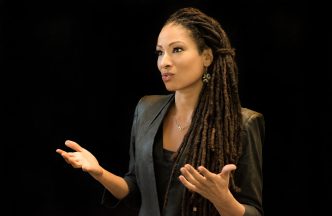
Ruha Benjamin
Associate Professor of African American Studies at Princeton University, Founder of the JUST DATA Lab
Keynote
Prof. Ruha Benjamin is an Associate Professor of African American Studies at Princeton University, where she studies the social dimensions of science, technology, and medicine. She is also the founder of the JUST DATA Lab and the author of two books, People’s Science (Stanford) and Race After Technology (Polity), and editor of Captivating Technology (Duke). She writes, teaches, and speaks widely about the relationship between knowledge and power, race and citizenship, health and justice.
From Ruha: I arrived here by way of a winding road that has snaked through South Central Los Angeles; Conway, South Carolina; Majuro, South Pacific, and Swaziland, Southern Africa. I come from many Souths, and I tend to bring this perspective, of looking at the world from its underbelly, to my analysis.
Ruha will speak on: Beyond Buzzwords: Innovation, Imagination, and Inequity in the 21st Century
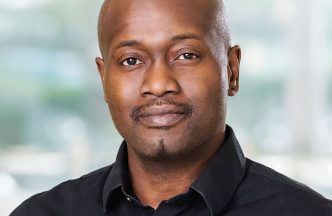
Samory Kpotufe
Assistant Professor, Department of Statistics, Columbia University
Keynote
Prof. Samory Kpotufe is an Assistant Professor, Department of Statistics, Columbia University, and was previously an assistant professor at Princeton university. His main practical aim is to design adaptive procedures, i.e., practical procedures that can self-tune to unknown structure in data (e.g., manifold, sparsity, clusters), while at the same time meeting the various constraints (e.g., time, space, labelling cost) of modern applications. He works generally in machine learning, with an emphasis on nonparametric methods and high-dimensional statistics.
Samory recently won the first prize in the 2018 Bell Labs Prize, and $100,000, for his pioneering work on the critically important field of ‘transfer learning’ in machine learning that answers the question of how and when can learning from one machine learning tool, be applied to another; this is a question that lies at the heart of all machine learning – is each model a ‘one off’ or can the learnings be applied to other scenarios, and if so when? Samory has answered this question with a breakthrough theory that provides a quantitative answer.
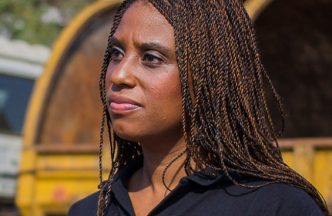
Aisha Walcott-Bryant
Research scientist and manager at IBM Research Africa - Nairobi, Kenya
Keynote
Dr Aisha Walcott-Bryant is a research scientist and manager at IBM Research Africa – Nairobi, Kenya. Her current research makes use of AI and Blockchain technologies to address the increasing incidence of chronic illnesses, such as many non-communicable disease affecting the continent of Africa. Specifically, she is leading a team that is developing solutions for the management of chronic illnesses by providing clinical decision support as well as patient engagement services.
She joined the IBM Research Africa lab, and leads the research efforts in mobility and transportation for developing cities. The aim was to provide significant and impactful value-added services that ease the movement of people, goods, and services in Africa. She and her colleagues developed innovative intelligent transportation systems data capture methods and analytical tools, to provide computational understanding about the local driving and infrastructure context.
Aisha has worked in Spain in the area of Smarter Cities at Barcelona Digital and Telefonica. She earned her PhD in the Electrical Engineering and Computer Science Department at MIT in robotics, as a member of the Computer Science and Artificial Intelligent lab (CSAIL).
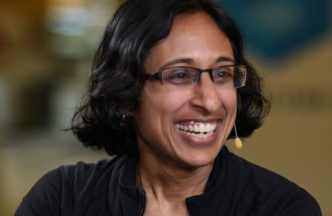
Finale Doshi-Velez
Assistant Professor of Computer Science at Harvard University
Keynote
Prof. Finale Doshi-Velez is an Assistant Professor of Computer Science at Harvard University. She is excited about methods to turn data into actionable knowledge. Her core research in machine learning, computational statistics, and data science is inspired by—and often applied to—the objective of accelerating scientific progress and practical impact in healthcare and other domains.
Specifically, she is interested in questions such as: How can we design robust, principled models to combine complex data sets with other knowledge sources? How can we design models that summarise and generate hypotheses from such data? How can we characterise the uncertainty in large, heterogeneous data to provide better support for decisions? Finale is interested in developing the probabilistic methods to address these questions.
Prior to joining SEAS, Finale was an NSF CI-TRaCS Postdoctoral Fellow at the Center for Biomedical Informatics at Harvard Medical School. She was a Marshall Scholar at Trinity College, Cambridge from 2007-2009, and she was named one of IEEE’s “AI
Top 10 to Watch” in 2013.
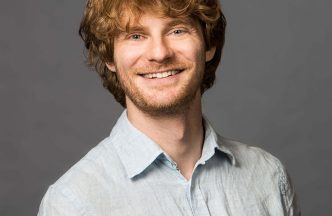
Richard Socher
Chief Scientist at Salesforce
Keynote
Dr Richard Socher is Chief Scientist at Salesforce. He leads the company’s research efforts and brings state of the art artificial intelligence solutions into the platform.
Prior, Richard was an adjunct professor at the Stanford Computer Science Department and the CEO and founder of MetaMind, a startup acquired by Salesforce in April 2016. MetaMind’s deep learning AI platform analyzes, labels and makes predictions on image and text data so businesses can make smarter, faster and more accurate decisions.
Richard was awarded the Distinguished Application Paper Award at the International Conference on Machine Learning (ICML) 2011, the 2011 Yahoo! Key Scientific Challenges Award, a Microsoft Research PhD Fellowship in 2012, a 2013 “Magic Grant” from the Brown Institute for Media Innovation, the best Stanford CS PhD thesis award 2014 and the 2014 GigaOM Structure Award. He is currently a member of the World Economic Forum’s ‘Young Global Leaders’ Class of 2017 and on the Board of Directors for the Global Fund for Women.
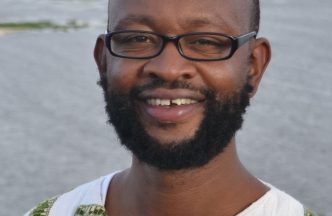
Ciira wa Maina
Lecturer at Dedan Kimathi University of Technology in Nyeri, Kenya, One of the driving forces of Data Science Africa (DSA)
Symposium Keynote and Makers Session
Dr Ciira wa Maina is widely known as a leader in the African machine learning community, driving forward research and teaching, and especially one of the driving forces of Data Science Africa (DSA).
Ciira graduated from the University of Nairobi, Kenya with a Bsc. degree in Electrical Engineering (First class honors) in 2007 and with a Ph.D. from Drexel University in Philadelphia, USA in September 2011. At Drexel he was a member of the Adaptive Signal Processing and Information Theory Research Group, directed by Prof. John MacLaren Walsh. Between October 2011 and August 2013 he was a postdoctoral researcher in computational Biology working with Prof. Magnus Rattray and Prof. Neil Lawrence at the University of Sheffield. Since September 2013 he has been a Lecturer in Electrical Engineering at Dedan Kimathi University of Technology in Nyeri, Kenya.
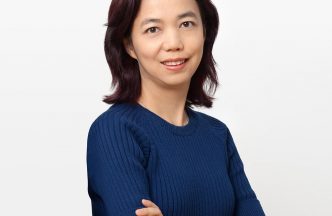
Fei-Fei Li
Professor in the Computer Science Department at Stanford University, and Co-Director of Stanford’s Human-Centered AI Institute
Dr. Fei-Fei Li is the inaugural Sequoia Professor in the Computer Science Department at Stanford University, and Co-Director of Stanford’s Human-Centered AI Institute. She served as the Director of Stanford’s AI Lab from 2013 to 2018. And during her sabbatical from Stanford from January 2017 to September 2018, she was Vice President at Google and served as Chief Scientist of AI/ML at Google Cloud. Many people will recognise Dr Li as one of the creators of the ImageNet challenge and for her important work in advancing the state of the art in computer vision and machine learning.
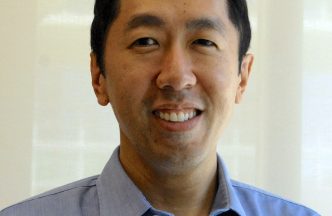
Andrew Ng
Co-founder and and former lead of Google Brain, former Vice President and Chief Scientist at Baidu
Dr Andrew Ng is one of the highly influential researchers in machine learning and AI, with his work having helped to drive the recent revolution in deep learning. Andrew co-founded and led Google Brain and was a former Vice President and Chief Scientist at Baidu, building the company’s Artificial Intelligence Group into a team of several thousand people. He is an adjunct professor at Stanford University (formerly associate professor and Director of its AI Lab). Also a pioneer in online education, Ng co-founded Coursera and deeplearning.ai. Since 2018 he launched and currently heads AI Fund, an investment fund for backing artificial intelligence startups. He has founded Landing AI, which provides AI-powered SaaS products and Transformation Program to empower enterprises into cutting-edge AI companies.


